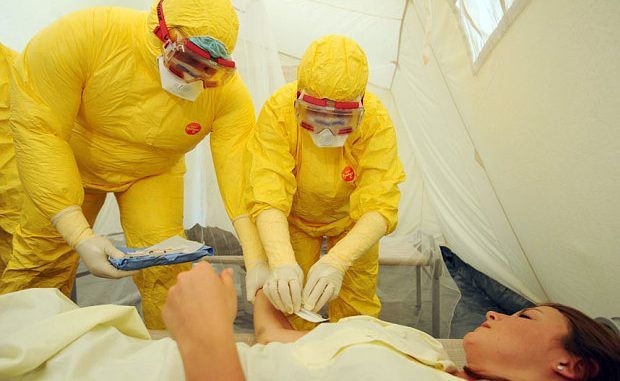
New research conducted in Liberia by U.S. neurologists has found that anyone who contracts Ebola will likely face a lifetime of disease and serious long-term neurological problems if they survive.
The study says that survivors will continue to suffer the affects of Ebola, even after they have been declared “Ebola-free” – meaning that contracting Ebola is for life.
Naturalnews.com reports:

BYPASS THE CENSORS
Sign up to get unfiltered news delivered straight to your inbox.
You can unsubscribe any time. By subscribing you agree to our Terms of Use
The preliminary results of the study were made public within days of the news that Pauline Cafferkey, a nurse who contracted the disease while volunteering in Sierra Leone, had been admitted to the hospital for a third time since “recovering” from the virus.
From The Guardian:
“Cafferkey, 40, who returned from working in the Kerry Town Ebola treatment unit in Sierra Leone, run by Save the Children, in December 2014, spent almost a month in isolation in the Royal Free in January 2015.
“When she was discharged and returned to her home in Scotland, it was assumed that her problems were over, but last October she again fell ill. She was diagnosed with meningitis, triggered by the Ebola virus lingering in her nervous system. Again she was transferred to the Royal Free, where she came close to death but rallied and returned home.”
This time, Cafferkey has been hospitalized “due to a late complication from her previous infection by the Ebola virus,” but is now considered to be in stable condition.
Survivors of the virus have reported a number of ongoing symptoms, the most common of which include fatigue, memory loss, headaches, depression and muscle pain.
When survivors were examined, many were found to display “abnormal eye movements, tremors and abnormal reflexes.”
Another survivor’s story
Another case of a Western survivor who has experienced long-term health issues after surviving Ebola involves an American infectious disease specialist named Ian Crozier, who contracted the virus in 2014 while working as a volunteer for the World Health Organization (WHO) in Sierra Leone.
Crozier nearly died during treatment at Emory University Hospital in Atlanta – after becoming unconscious he was placed on a respirator and given dialysis. He survived the ordeal, but after being released from the hospital he continued to suffer from the after-effects of the disease; he had to learn how to walk again and was severely exhausted all the time, but felt lucky to have survived.
Nine weeks later, he began noticing vision problems. Ebola survivors commonly suffer from inflammation of the eye, and an initial examination seemed to indicate that, aside from some internal scarring of the eye, he was okay.
A month after that, he began to experience a burning pain in the eye, and despite corticosteroid treatment, his vision continued to deteriorate. Then one day, he looked in a mirror and noticed that his left eye had turned from blue to a strange green color.
When doctors extracted fluid from the eye, they found it contained live Ebola virus. While taking the necessary steps to prevent the disease from infecting others, the doctors increased the steroid dosage and gave Crozier an experimental antiviral drug.
As reported by Wired:
“Mercifully, it worked. Over the following weeks, Crozier’s symptoms gradually cleared. His eye turned blue again and his vision slowly returned. As it did, Crozier began to have questions. ‘While my eye was going blind, I was fascinated by the science going on,’ Crozier says. Now he was thinking of his former patients in Sierra Leone. From fairly early on in the outbreak, anecdotal reports had emerged of survivors struggling with ‘post-Ebola syndrome’ – symptoms ranging from vision loss to hearing loss, joint pains, headaches and memory loss. There were even some rare reports of survivors dying suddenly. Could it be that they too still had the virus inside them? Or was it something else entirely?”
Crozier and Cafferkey’s cases, along with the results of the new research, have shown that little is truly understood about the long-term effects of the Ebola virus, but it’s clear that they indeed exist, and certainly warrant further study.


